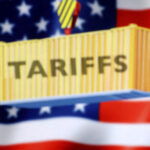The bilateral trade between the United States and Nigeria has hit a total of $1.33 billion in the first two months of 2025, official data has revealed, including the dynamism of US-Nigeria trade amid the current global trade war.
This figure showed that in the month leading up to the imposition of a 14% tariff on imports from Nigeria to the United States by President Donald Trump, there was notable evidence of a strong US-Nigeria trade relationship.
The data, drawn from the United States Trade in Goods report and the United States International Trade Commission (USITC), also shows a dynamic start to 2025 for US-Nigeria trade.
According to the data, the US imported a staggering $643.1 million worth of goods from Nigeria in the first two months of 2025.
The official data from the USITC showed that customs-based imports from Nigeria in February 2025 stood at $286.3 million, down 32.4% from $423.6 million in February 2024.
On a year-to-date basis, imports dropped from $951.6 million in 2024 to $643.1 million in 2025, a reduction of 32.4%.
When measured on a Cost, Insurance, and Freight (CIF) basis, which includes shipping and insurance costs, imports fell from $979.6 million in 2024 to $666.3 million in 2025, a 32% decrease.
Despite this downturn, Nigeria’s trade balance with the US showed resilience. The customs-based trade balance for February 2025 improved by 142.2%, rising to $187.2 million from $77.3 million in February 2024. Year-to-date, the trade balance swung from a $158.8 million deficit in 2024 to a $44.3 million surplus in 2025—a recovery of 127.9%.
Nigeria’s exports on a Free Alongside Ship basis totalled $473.6 million in February 2025, down 5.5% from $501 million in February 2024. Year-to-date exports also declined, falling from $792.8 million in 2024 to $687.4 million in 2025, a decrease of 13.3%.
Also, in January 2025, the US recorded a trade deficit of $143 million against Nigeria, according to the US Trade in Goods report.
However, in February, the US posted a surplus of $187 million, resulting in a year-to-date surplus of $44 million. Nigeria’s exports to the US increased significantly in February, reaching $474 million, up from $214 million in January.
This marked an increase of 121.5 per cent. On a year-to-date basis, Nigeria’s exports to the US totalled $687m, showing a strong recovery after a slow start to the year.
However, US imports from Nigeria declined, with February’s imports valued at $286 million, down 19.9% from January’s $357 million. Year-to-date, imports total $643 million, showing a reduction in volume compared to the previous month.
In the same vein, it was gathered that the US imported crude oil worth $413.57m from Nigeria in the first two months of 2025, according to data from the United States Trade in Goods report.
The US-Nigeria trade data shows that the total volume of crude oil imported from Nigeria during this period was 5.3 million barrels.
Crude oil accounted for approximately 64.31 per cent of the total imports from Nigeria to the US, which stood at $666.3m in the first two months of the year.
This highlights the significant role of crude oil in Nigeria’s export portfolio to the US.
In February 2025, the volume of crude oil imported from Nigeria to the US was 1.8 million barrels, valued at $142.2m.
This marked a significant drop from January 2025, when the volume was higher at 3.5 million barrels, valued at $271.4m.
The data revealed that the value of crude oil imports fell by 47.6 per cent month-on-month.
The year-to-date customs value of crude oil imports from Nigeria stood at $413.6m as of February 2025.
Month-on-month, the data shows that the customs value of imports in February was significantly lower than in January.
The C.I.F. value of crude oil imports from Nigeria to the US was $146.2m in February, compared to $278.2m in January.
The cumulative C.I.F. value for the first two months of the year stood at $424.4m. The month-on-month analysis shows a decrease of 47.4 per cent in the C.I.F. value between January and February.
While oil and mineral exports remain exempted from the new tariffs, analysts have expressed concerns about the potential impact on other sectors.
This comes after the Nigerian government had expressed intention to engage in consultations with the U.S. and the World Trade Organization (WTO) to address the implications of a newly imposed 14% tariff on Nigerian exports by the U.S. administration.
Introduced under Trump’s trade policy, the tariff has sparked concerns about its potential to disrupt the $10 billion annual US-Nigeria trade relationship.
On August 2, 2025, Trump announced a revised tariff for Nigeria, disclosing that imports from Nigeria will now attract a 15% tariff, an increment from the initial 14%.
Trump had in April imposed tariffs on several global trading partners, with a 14 per cent levy placed on Nigerian exports.
The “reciprocal” tariffs were later postponed for 90 days to allow time for negotiating individual trade agreements, with the new deadline set for August 1.
Pan-Atlantic Kompass reports that U.S. exports to Nigeria have skyrocketed by 41%, soaring from $2.36 billion in H1 2024 to $3.34 billion in H1 2025
Nigeria’s Minister of Industry, Trade, and Investment, Dr Jumoke Oduwole, noted that the government is working to mitigate the tariff’s impact while diversifying export markets. “We’re committed to ensuring a strong, resilient economy despite global trade headwinds,” Oduwole said, emphasizing efforts to bolster intra-African trade through the African Continental Free Trade Area (AfCFTA).
This means that the U.S. recorded a trade surplus of $576 million in the first half of 2025. The growth in U.S. exports to Nigeria comes after Trump slapped a 15% tariff on imports from Nigeria.
The tariffs proved to have had a major impact on the Nigerian-U.S. trade as Trump’s administration recorded a massive swing from a deficit of $779 million in H1 2024 to a trade surplus of $576 million in the first half of 2025.
This data was contained in a report published by the U.S. Census Bureau and the Bureau of Economic Analysis.
Analysis of the data showed that U.S. exports to Nigeria have grown while Nigerian exports to the U.S. took a hit.
This swing is more pronounced in the June 2025 figures. According to the data, U.S. exports to Nigeria surged to $919 million, up 196% from $310 million in June 2024.
The official data about the U.S.-Nigeria trade in 2025 has been revealed. According to data from the U.S Census Bureau, the United States reduced its purchases of Nigerian goods by about $615 million in the first eight months of 2025.
The revelation follows the introduction of new tariffs by Trump.
Official data revealed that American imports of Nigeria-sourced goods fell from $4.197bn between January and August 2024 to $3.582bn in the corresponding period of 2025, representing a year-on-year decline of 14.7 per cent.
Although crude oil has been exempted in several cases, the higher duty applies directly to a wide range of non-oil Nigerian exports, creating uncertainty for American importers and dampening demand ahead of and after the effective date.
In July 2025, American purchases of Nigerian goods fell to $379m from $673m in July 2024, a 43.7 per cent decline of $294m.
Imports recovered slightly in August, rising to $442m from $382m in the same month of 2024, an increase of 15.7 per cent. However, the mild August rebound was not enough to offset the earlier weakness that pulled down the year-to-date totals.
In contrast, the United States exported far more goods to Nigeria. U.S exports to the country rose sharply from $3.169bn in the first eight months of 2024 to $4.751bn in the same period of 2025, an increase of $1.582bn or 49.9 per cent. The surge was driven partly by a major rise in August exports, which climbed to $830m from $230m in August 2024.
The $600m expansion represents a 260.9 per cent increase, giving American suppliers a stronger presence in the Nigerian market just as U.S import demand for Nigerian goods weakened. July exports were more modest, rising from $576m in 2024 to $584m in 2025, a 1.4 per cent increase.
Pan-Atlantic Kompass reports that this means that there is a significant shift in the U.S.-Nigeria trade balance. The August 2024 position of a $152m U.S goods deficit with Nigeria flipped to a $388m surplus in August 2025. Year-to-date, the United States moved from a $1.028bn deficit in 2024 to a $1.169bn surplus in 2025, a swing of $2.197bn within one year.





